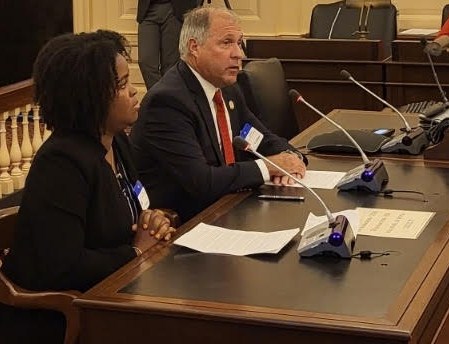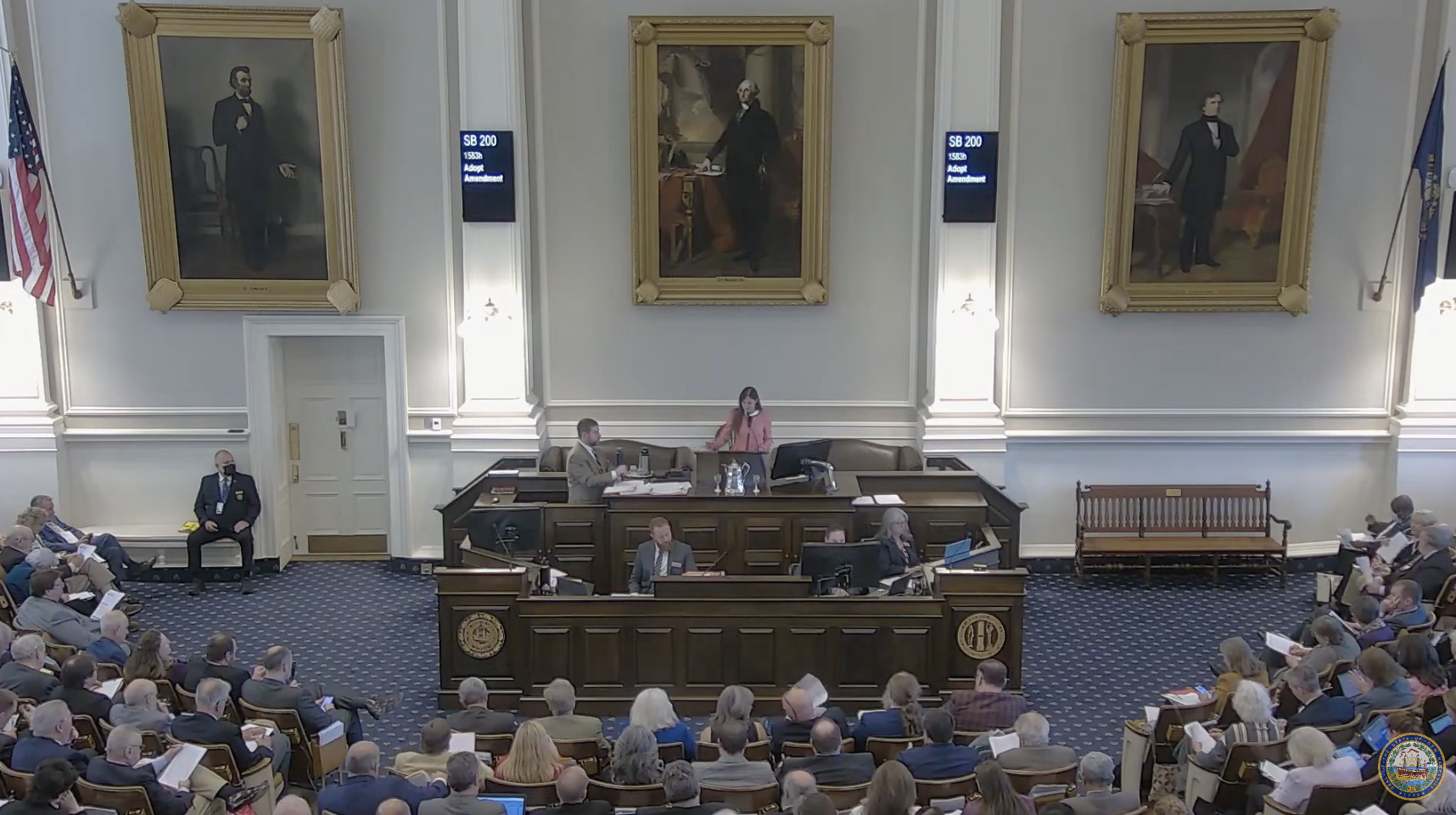In June 2020, Iowa was in hot pursuit of injection rights for several clinical indications, including subconjunctival injections to treat ocular conditions, intralesional injections to treat chalazia, botulinum toxin (including for cosmetic purposes) and injections to counteract an anaphylactic reaction. Due to last-minute negotiations to get the bill passed, a line was added omitting the use of injectable anesthetics.
In this year’s legislative session, Iowa optometrists fought to reintroduce this line to the scope of practice, and they were successful. On April 28, Governor Kim Reynolds signed HR 347, allowing the nearly 1,400 ODs in Iowa to use injectable anesthetics when appropriate to practice optometry as licensed in the state. The exact line added to the practice scope reads that licensed ODs in Iowa have the right to use “local anesthetics prior to a minor surgical procedure authorized by this chapter.”
“We went back to the legislators this time and explained that we really couldn’t properly utilize injections without having access to the anesthesia portion,” says Don Furman, OD, president of the Iowa Optometric Association. “The clarification allowed the original injections law to function as everyone originally intended it to.”
The legislation received strong bipartisan support from both the Iowa Senate (48-2) and House (90-8). While the opposition expressed concern about the absence of additional training guidelines in HR 347, Dr. Furman explains that this is because “all relevant coursework was included in the original training requirements [in the 2020 bill].”
As all states pushing scope legislation would echo, OD-legislator relationships are key to ensuring that the individuals voting on the bill understand its importance. “Due to our efforts in building grassroots relationships with many of our state legislators, we were able to have factual discussions regarding how the original wording was a limiting factor in providing needed care to patients across the state,” notes Dr. Furman. “We appreciate all of our legislators that provided bipartisan support for this clarification language, and we thank them for listening.”
The updated law goes into effect tomorrow, July 1.
Laser Legislation Moves Forward in New Jersey
The prospect of optometric laser authority is growing nearer for the nearly 1,300 ODs licensed in New Jersey, who haven't seen a change to their practice scope in nearly 15 years aside from COVID emergency regulations. In May, the state introduced two identical bills to the Assembly (AB 5445) and Senate (SB 3841) proposing to allow New Jersey optometrists to perform three laser procedures—trabeculoplasty, capsulotomy and iridotomy—as well as remove chalazia, skin tags and other lesions. Additionally, the bills propose an expansion of optometrists’ vaccination and prescription authority.
 |
| Optometrists Chris Quinn and Jessica Garden testified in favor of New Jersey's laser bill, AB 5445, on behalf of the NJSOP during a Committee hearing last week. Photo: NJSOP. Click image to enlarge. |
The Assembly bill was transferred to the Assembly Oversight, Reform and Federal Relations Committee on June 22. That same day, after hearing the testimonies of Chris Quinn, OD, and Jessica Garden, OD, of the New Jersey Society of Optometric Physicians (NJSOP), the Committee voted unanimously in favor of AB 5445 and sent it forward into the hands of the Assembly Regulated Professions Committee, which is next in line to debate the legislation in the coming weeks. If the bill passes that Committee, it will then be heard by the full Assembly. Meanwhile, SB 3841 is still awaiting a hearing within the Senate Commerce Committee.
During last week’s Committee hearing, Dr. Quinn—an optometrist practicing in Middlesex County and a past president of the NJSOP—remarked on the stand that “There will be three million New Jerseyans over the age of 60 by 2030, an increase of nearly a million individuals. These individuals will require increased healthcare services from a system and workforce that are already strained, but optometrists can be part of the solution.”
Dr. Garden, who is also an NJSOP member and practicing optometrist in Hudson County, also pointed out during her testimony that there are nearly two times as many optometrists in New Jersey as there are ophthalmologists, and optometrists serve as the primary eyecare provider for more than two-thirds of the state population. “This legislation allows optometrists to provide care when and where it's needed and will lower costs by eliminating duplication of services and additional co-pays, healthcare costs, caretaker arrangements, travel time and time spent with blurry vision,” Dr. Garden told Committee members. “According to a 2019 report, issued by New Jersey-based Avalon Health Economics, nationally expanded optometric scope of practice results in an annual system-wide savings of $4.6 billion.” She also cited a 2018 report from the US Department of Health and Human Services, which advised that “states should consider changes to their scope of practice statutes to allow all healthcare providers to practice the type of their license utilizing the full skillset.”
NJSOP executive director, Keira Boertzel-Smith, JD, says, “The NJSOP thanks Drs. Chris Quinn and Jessica Garden for testifying on behalf of NJSOP.” She adds that several new sponsors have signed onto the legislation in the last few weeks to help strengthen the support for the bill, which, if passed, would make New Jersey the 11th state in the country to permit the use of optometric lasers.
To learn how you can support New Jersey’s legislative battle to add lasers and other procedures to its optometric practice scope, please contact the NJSOP.
New Hampshire Vaccine Bill Awaits Governor’s Signature
After passing both the Senate and House in early June, a bill in New Hampshire that would allow optometrists to administer FDA-approved vaccinations to adults for influenza, COVID-19 and shingles is on its way to the desk of Governor Chris Sununu for his signature, which is expected in the coming days or weeks. If SB 200 becomes law, it will increase the number of healthcare providers in the state able to administer these vaccines by several hundred.
 |
| An amendment to SB 200 was proposed in the New Hampshire House to delay mRNA vaccines by two years, which was denied with a vote of 105-275. Click image to enlarge. |
In the House, a potentially disruptive amendment was introduced that would have delayed the bill’s inclusion of mRNA vaccines by two years due to concerns regarding insufficient research on the vaccine’s potential side effects. However, the House denied the amendment with a vote of 105-275, allowing the final bill to retain language that will permit ODs to administer mRNA COVID-19 vaccines to their patients.
Other minor amendments included in the final version of SB 200 relate to the qualifications of optometrists who wish to administer these vaccines to their patients. For example, unlike the introduced bill, the final document states that ODs must have at least $1,000,000 of professional liability insurance coverage and have active certification in basic cardiopulmonary resuscitation, along with other requirements.
The new law will take effect 60 days after Gov. Sununu’s signature.
Nebraska SLT Bill Stalled Till 2024
On January 10, Nebraska introduced LB 216, a bill proposing to authorize the state’s optometrists to perform selective laser trabeculoplasty (SLT), a non-invasive procedure that’s increasingly being recognized as a first-line treatment for glaucoma. The legislation was last heard by the Health and Human Services Committee on January 26, where it currently remains awaiting a vote that’s expected sometime next year.
The Nebraska Optometric Association (NOA) commented recently that it will be continuing its advocacy efforts with Committee members to vote the bill out of Committee during the 2024 legislative session. Nebraska ODs who want to participate in advocacy efforts can contact the NOA to learn how they can help strengthen optometry’s voice in the state’s ongoing battle for scope expansion.
Keep an eye on Review of Optometry’s online News Feed to stay informed and read periodic updates on new developments in various states’ legal battles for scope expansion.

